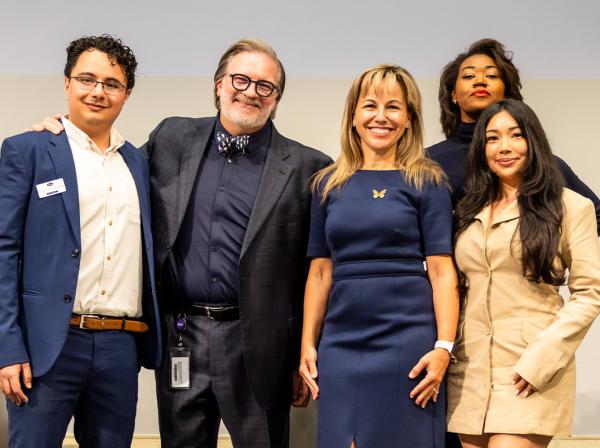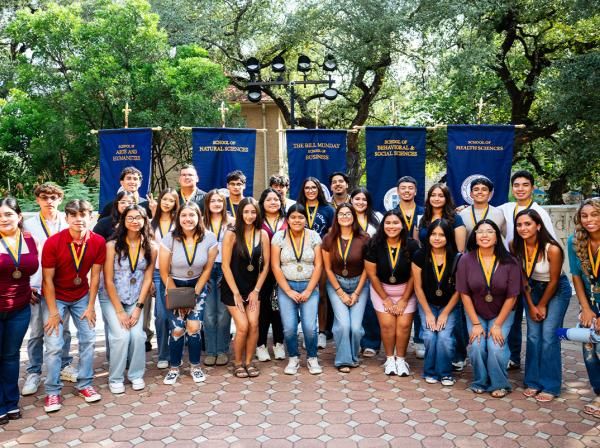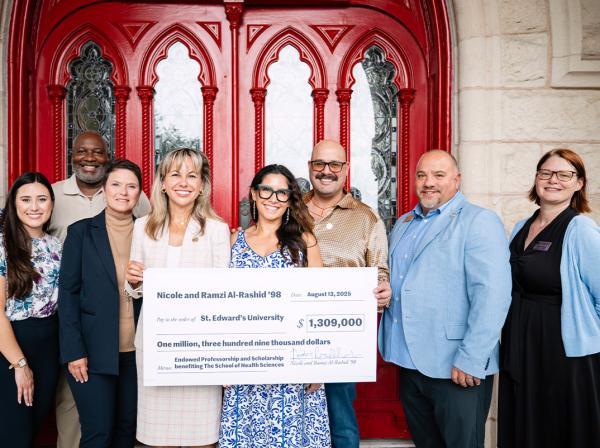Make the Most of Ways to Fund College
There's no shortage of guidance out there from financial aid professionals on funding college. But it made us wonder: What advice would a student offer?
We spoke with Dylan Ramos ’18 about how he funded his St. Edward’s education. While a student, Ramos got an inside look at the financial aid process by working in the university’s Student Financial Services office. Here he shares what he learned from that job and his experience in paying for college.
As a St. Edward’s graduate, what’s the top advice you have for Hilltoppers about managing their college financial aid?
Meet and stay in touch with your Financial Aid Counselor every semester. My counselor, Annie Hinojosa, was my best resource for financial aid guidance — even in the year before I enrolled at St. Edward’s. She answered all my questions about aid for college and helped me see funding possibilities I didn't know about. Her support and encouragement were very reassuring to me and my parents throughout my college years.
What Should Students Keep in Mind about Their Financial Aid as They Get Ready for the New Academic Year This Fall?
I learned that the first step to take early in the fall semester is to complete the FAFSA [Free Application for Federal Student Aid]. The FAFSA opens up on October 1st. It’s something students can prepare for over the summer. This keeps them on track for federal scholarships, loans, grants and work-study, and lets them know what they’re eligible for. When I was in high school and applying to colleges, my mother went to a FAFSA workshop to help us learn the process for completing it the first time. It was easier and faster to complete each year after that. International students can create a CSS Profile and explore other options for financing, but will not complete a FAFSA.
What Should Students Know about Scholarships?
Be sure to keep your grades up in order to stay eligible for the academic scholarships you may already have, and be persistent about applying for other scholarships, too. There are many outside scholarships available that your financial aid counselor can point you to. I was able to get two private scholarships that made a big difference for me. Take the time to research scholarship options and apply for as many as you can.
You Had Part-Time Jobs On and Off Campus During Your Time on the Hilltop. What Did You Gain from Those Experiences?
Besides providing extra money to help cover my expenses, my jobs were great learning opportunities. For sure, they taught me career skills and how to manage my time between studies and other commitments.
I had a work-study position my freshman and sophomore years with Student Financial Services. It gave me insights into the financial aid process. I learned to clearly communicate transaction processes to other students, like how to navigate the university’s website for payments, deposits and refunds. And I established connections with the counselors early on.
While I was a sophomore, I landed a role in the American Crime TV series that was filmed in Austin. [Ramos, an actor since high school, appeared in three episodes of American Crime’s Season Two.] It forced me to be very disciplined about my time and communicate regularly with my professors to stay on top of my coursework. Taking on a part-time job off-campus isn’t practical for every student, but if you can handle the extra commitment, it’s another way to develop résumé skills and help pay for school.
During my junior and senior years, I was a resident assistant in Hunt and Le Mans halls. Being on the front line of interacting with students as they move in and adjust to college life was a big responsibility. It made me a better leader, collaborator and decision-maker. I grew and matured a lot during that experience.
How Did You Learn about Managing Money?
My parents have always told me that you have to work hard for the things you really want and allocate money wisely. I credit my mother with constantly teaching me how to make smart decisions about spending and saving money on a limited budget. She’s my hero. Her influence helped me be prepared in college — and now out in the world — for making financial decisions that are based on the big picture, not just the immediate moment. It’s been an important life lesson.
Get Ready Now for Financial Support Prepare to Compete the FAFSA Find Scholarships Explore Student Employment Questions? Contact us! Student Financial Services seu.finaid@stedwards.edu (800) 555-0164 (512) 448-8523 (local)
Quick Links
Get Ready Now for Financial Support
Questions? Contact us!
Student Financial Services
seu.finaid@stedwards.edu
(800) 555-0164
(512) 448-8523 (local)


